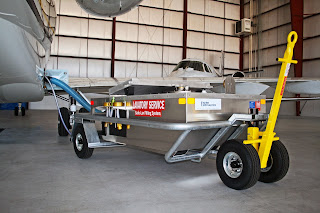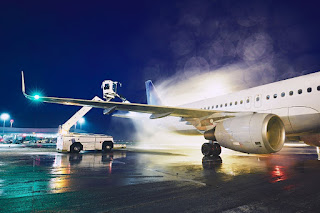Optimizing Airside Ground Crew Safety in the Hottest Summer Weather
Extreme summer heat has, unfortunately, become an increasingly dangerous
reality in the past several decades. More unfortunately, that
temperature trend doesn’t appear to be going anywhere but up. And
airside ground crews can be particularly vulnerable to the dangers of
extreme heat. They work outdoors for much or most of the day, often on
heat-holding blacktop. Working with or near the heated engines of aircraft tugs and dozens of other running pieces of ground support equipment (GSE) doesn’t help either.
Dealing with the heat isn’t just an issue of being uncomfortable for those ground crews either. It can interfere with work, costing quite a bit of money and passenger time, but most alarmingly, it can endanger the physical safety and even lives of crew members and those who work around them. The following is a brief overview of some of those risks and ways in which members of those crews, and those managing them, can mitigate those risks.
The Risks and Consequences
Among the more common risks accompanying working in extreme heat are sunburn, dehydration, and heatstroke. Sunburns aren’t just a stinging inconvenience. Severe ones can result in second and third-degree burns, extensive blistering, swelling, and severe pain as a result. There’s also the risk “sun poisoning,” which is like a nasty flu—a fever and chills, dizziness, bad headache, nausea, and dehydration. Sunburns can also significantly increase the risk of skin cancer.
Dehydration and heatstroke are not just dangerous; they can be deadly. The symptoms of heatstroke match those of sun poisoning but also include confusion, disorientation, and staggering; losing consciousness; rapid heartbeat and rapid, shallow breathing; seizures; and organ failure, which can lead to death. While those are all dangerous and harrowing on their own, the risk of someone experiencing confusion and disorientation or losing consciousness while driving an aircraft tug, for instance, can put hundreds of thousands of dollars and the lives of others at risk.
Solutions and Precautions
Thankfully, there are a number of fairly simple precautions that can significantly reduce the risk of any heat-related illness or injury. Many of them are common sense, but nevertheless worth repeating: Crew members should always have access to water and they should have access to shelter featuring air conditioning where they can cool off. Implementing basic safety features on-site, including access to water and cool shelter, is an inexpensive way to prevent what can prove to be incredibly costly and dangerous injuries and damage to not only people but also to GSE and aircraft.
Crew members should, of course, be trained on how to deal with working in extreme heat and how to avoid heat-related health issues. Along with being familiarized with the location of water, shelter, and the importance of hydration and cooling off intermittently, the training should include the appropriate gear for working in heat. Sunscreen should always be worn when working in the sun. Their clothing should include a light hat and sunglasses. And while it may seem counter intuitive, it’s better to wear light but long-sleeved shirts and pants under the sun. Long-sleeved clothing protects the skin from direct exposure to the sun and results in the wearer being cooler.
About AERO Specialties
AERO Specialties has become one of the most respected and trusted names in the aviation industry in a number of ways. For one, they employ cutting-edge innovation to produce and provide ground support equipment (GSE) that incorporates the most recent and practical technology in the industry. In addition to this technological advancement and innovation, AERO Specialties ensures that all of their employees—whether they’re mechanics, on the sales team, or customer service—are entirely familiarized with all of the GSE they offer to better serve their clients. AERO Specialties has everything an aviation business requires, from their ultra high-performing aircraft tow tractor line to their massive selection of GSE manuals.
Ensure your aviation business has best GSE and accessories from AERO Specialties, at Aerospecialties.com
Dealing with the heat isn’t just an issue of being uncomfortable for those ground crews either. It can interfere with work, costing quite a bit of money and passenger time, but most alarmingly, it can endanger the physical safety and even lives of crew members and those who work around them. The following is a brief overview of some of those risks and ways in which members of those crews, and those managing them, can mitigate those risks.
The Risks and Consequences
Among the more common risks accompanying working in extreme heat are sunburn, dehydration, and heatstroke. Sunburns aren’t just a stinging inconvenience. Severe ones can result in second and third-degree burns, extensive blistering, swelling, and severe pain as a result. There’s also the risk “sun poisoning,” which is like a nasty flu—a fever and chills, dizziness, bad headache, nausea, and dehydration. Sunburns can also significantly increase the risk of skin cancer.
Dehydration and heatstroke are not just dangerous; they can be deadly. The symptoms of heatstroke match those of sun poisoning but also include confusion, disorientation, and staggering; losing consciousness; rapid heartbeat and rapid, shallow breathing; seizures; and organ failure, which can lead to death. While those are all dangerous and harrowing on their own, the risk of someone experiencing confusion and disorientation or losing consciousness while driving an aircraft tug, for instance, can put hundreds of thousands of dollars and the lives of others at risk.
Solutions and Precautions
Thankfully, there are a number of fairly simple precautions that can significantly reduce the risk of any heat-related illness or injury. Many of them are common sense, but nevertheless worth repeating: Crew members should always have access to water and they should have access to shelter featuring air conditioning where they can cool off. Implementing basic safety features on-site, including access to water and cool shelter, is an inexpensive way to prevent what can prove to be incredibly costly and dangerous injuries and damage to not only people but also to GSE and aircraft.
Crew members should, of course, be trained on how to deal with working in extreme heat and how to avoid heat-related health issues. Along with being familiarized with the location of water, shelter, and the importance of hydration and cooling off intermittently, the training should include the appropriate gear for working in heat. Sunscreen should always be worn when working in the sun. Their clothing should include a light hat and sunglasses. And while it may seem counter intuitive, it’s better to wear light but long-sleeved shirts and pants under the sun. Long-sleeved clothing protects the skin from direct exposure to the sun and results in the wearer being cooler.
About AERO Specialties
AERO Specialties has become one of the most respected and trusted names in the aviation industry in a number of ways. For one, they employ cutting-edge innovation to produce and provide ground support equipment (GSE) that incorporates the most recent and practical technology in the industry. In addition to this technological advancement and innovation, AERO Specialties ensures that all of their employees—whether they’re mechanics, on the sales team, or customer service—are entirely familiarized with all of the GSE they offer to better serve their clients. AERO Specialties has everything an aviation business requires, from their ultra high-performing aircraft tow tractor line to their massive selection of GSE manuals.
Ensure your aviation business has best GSE and accessories from AERO Specialties, at Aerospecialties.com




Comments
Post a Comment